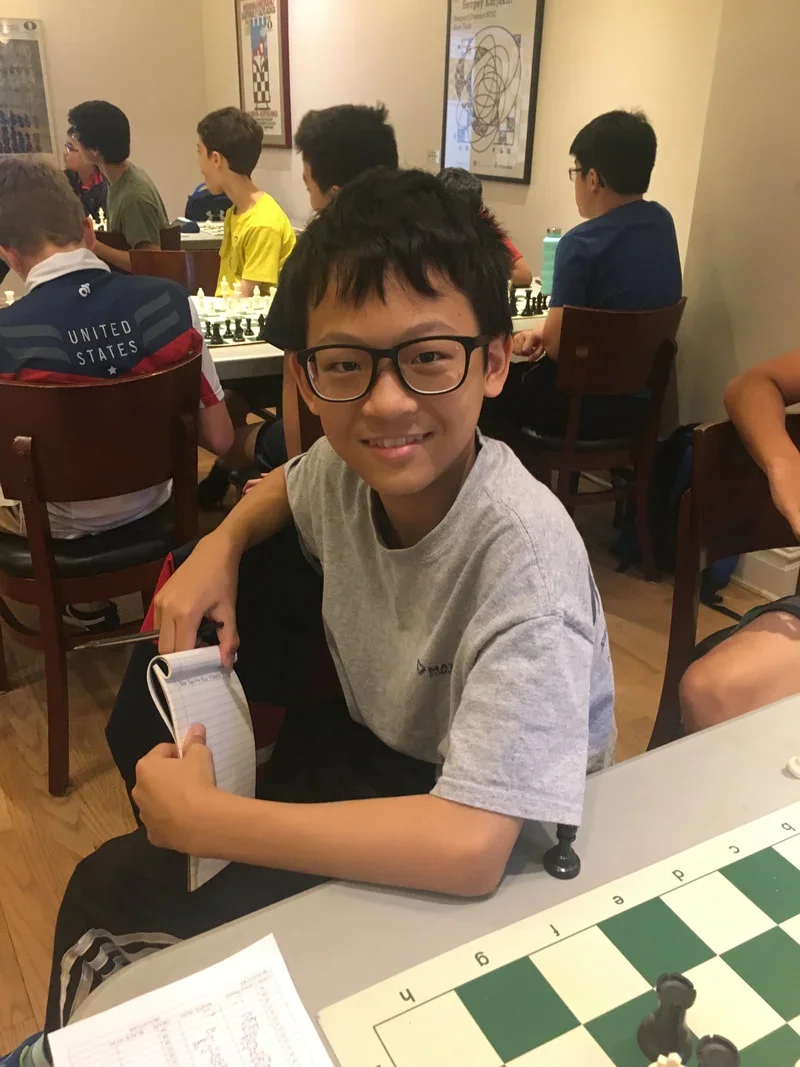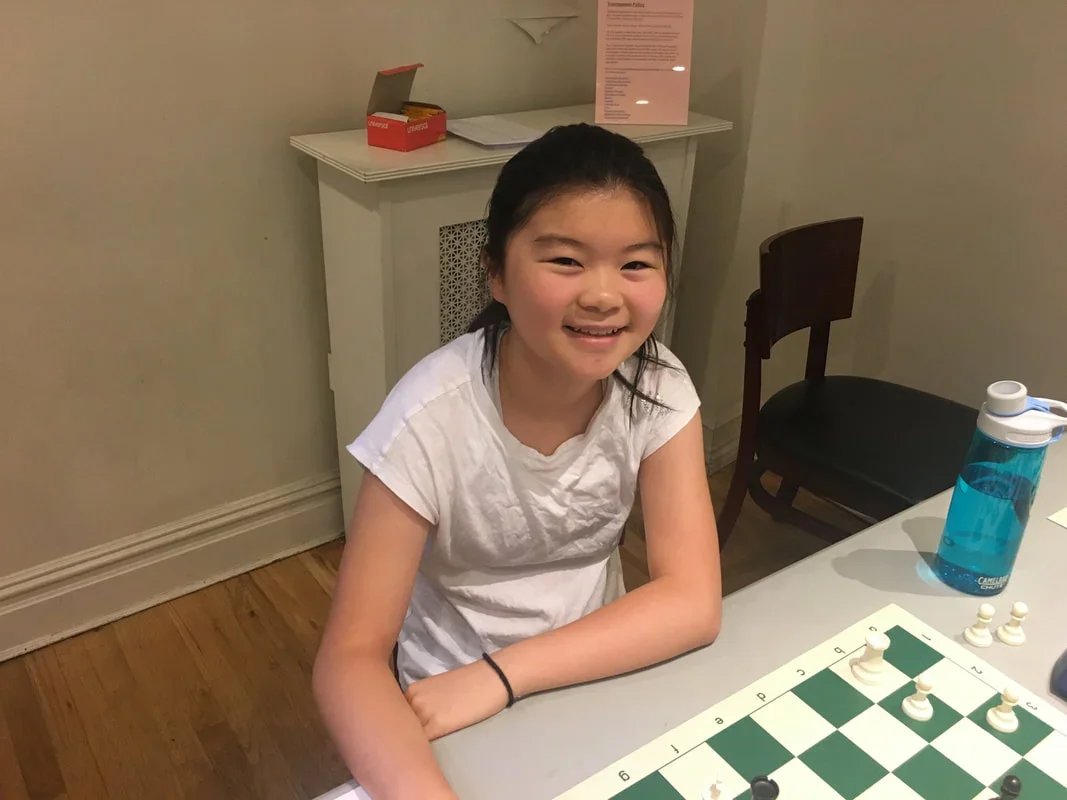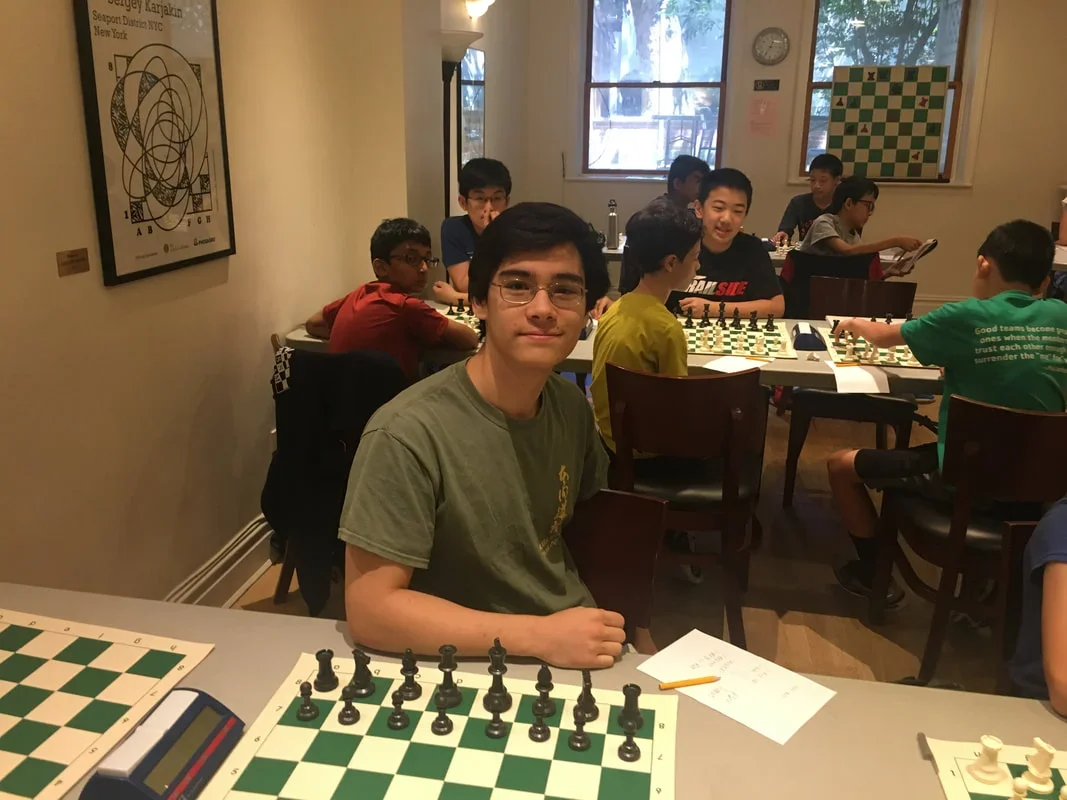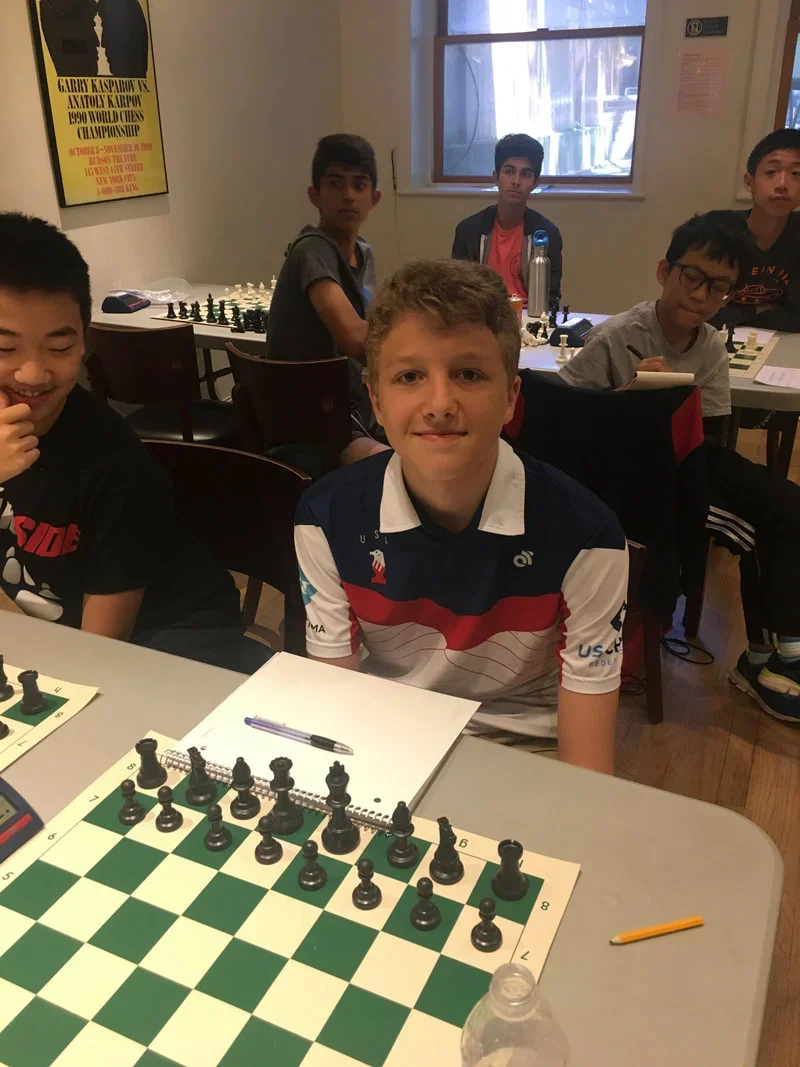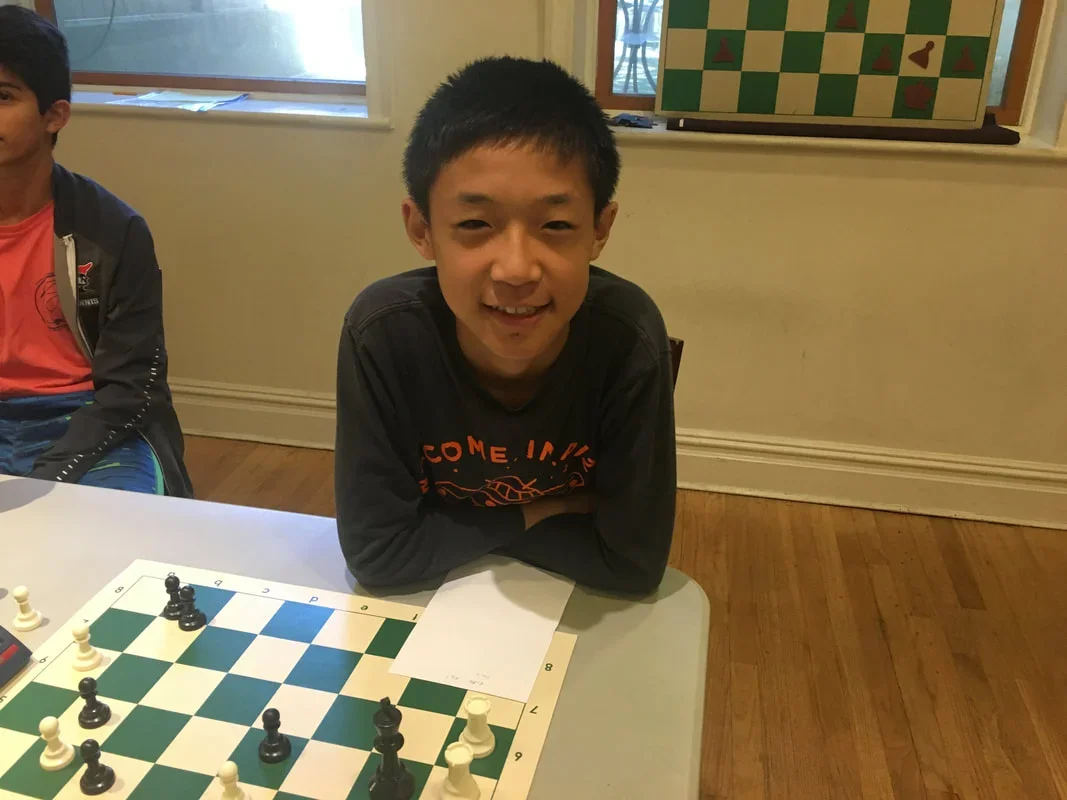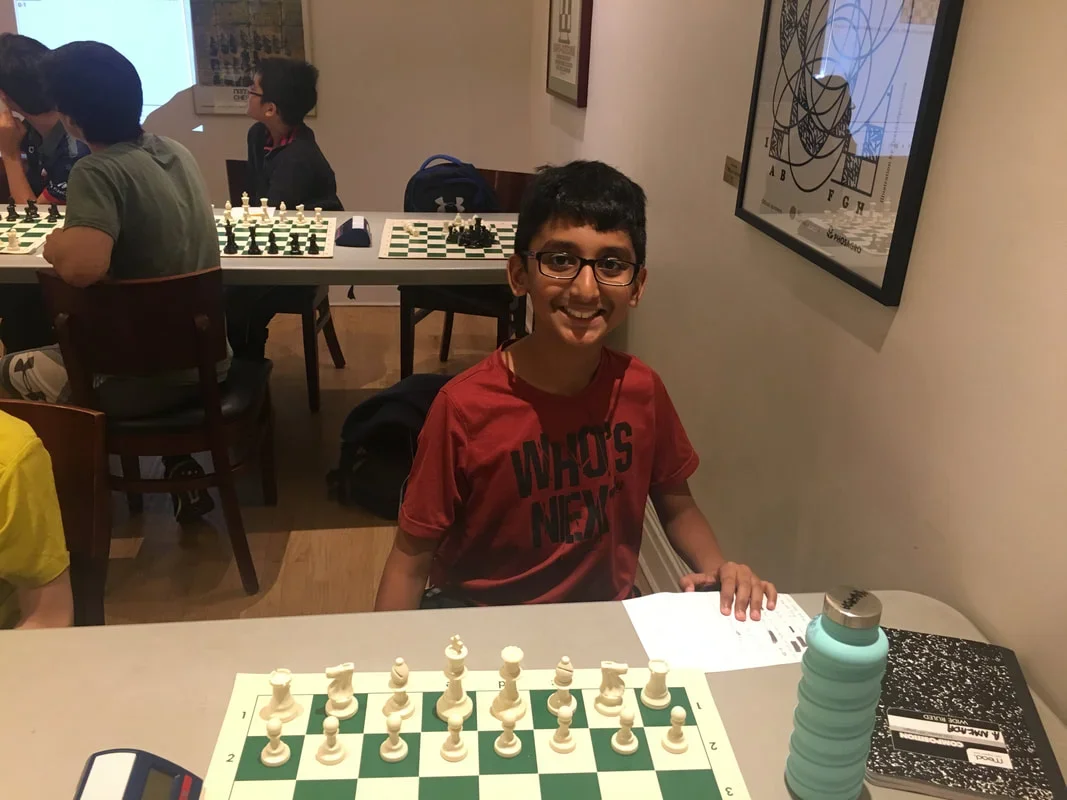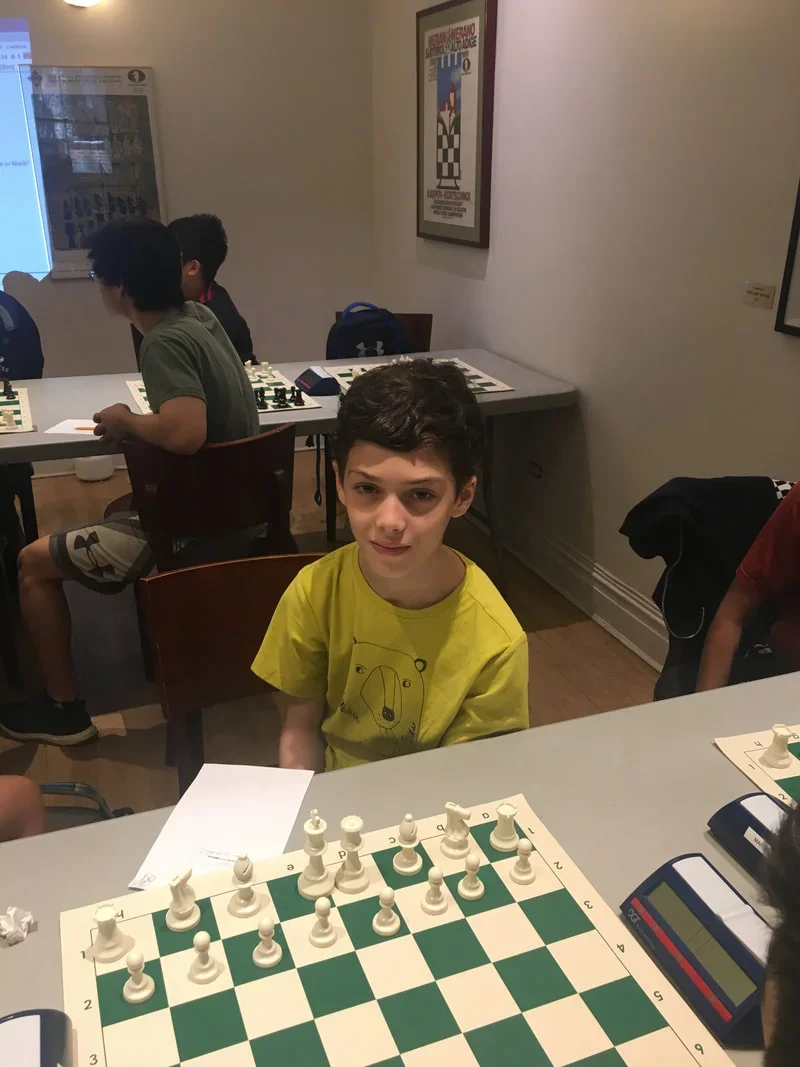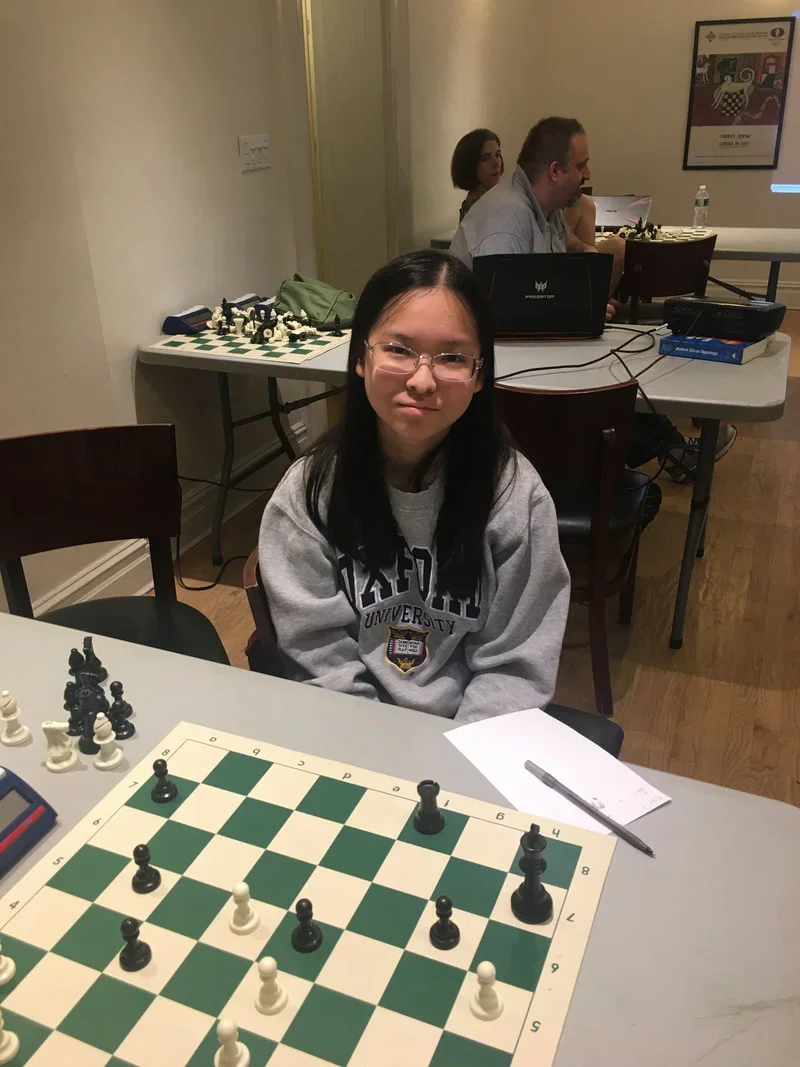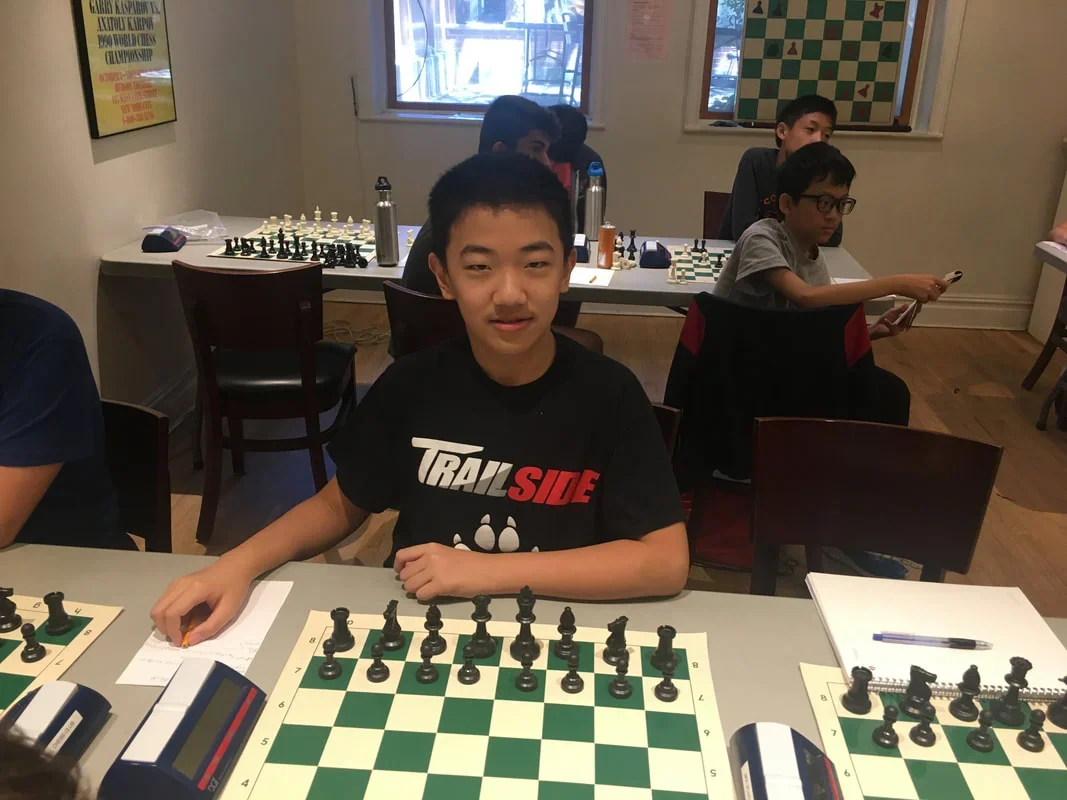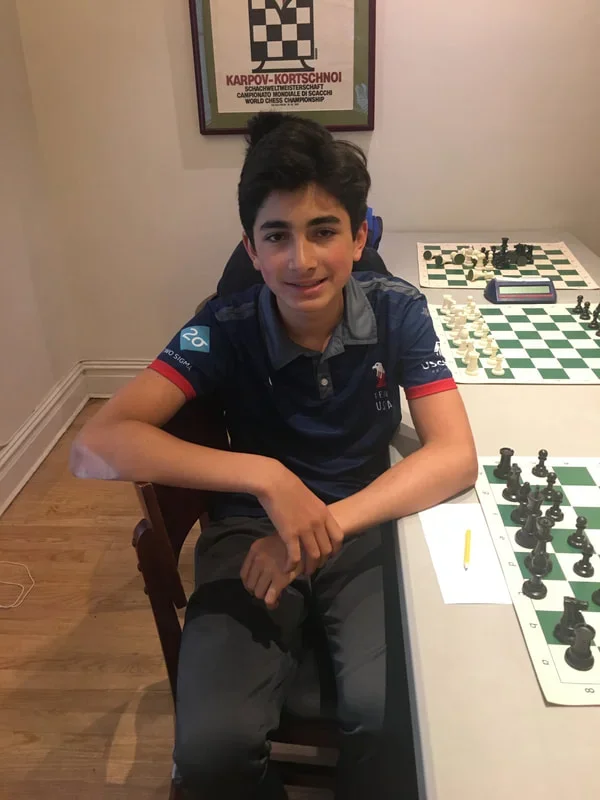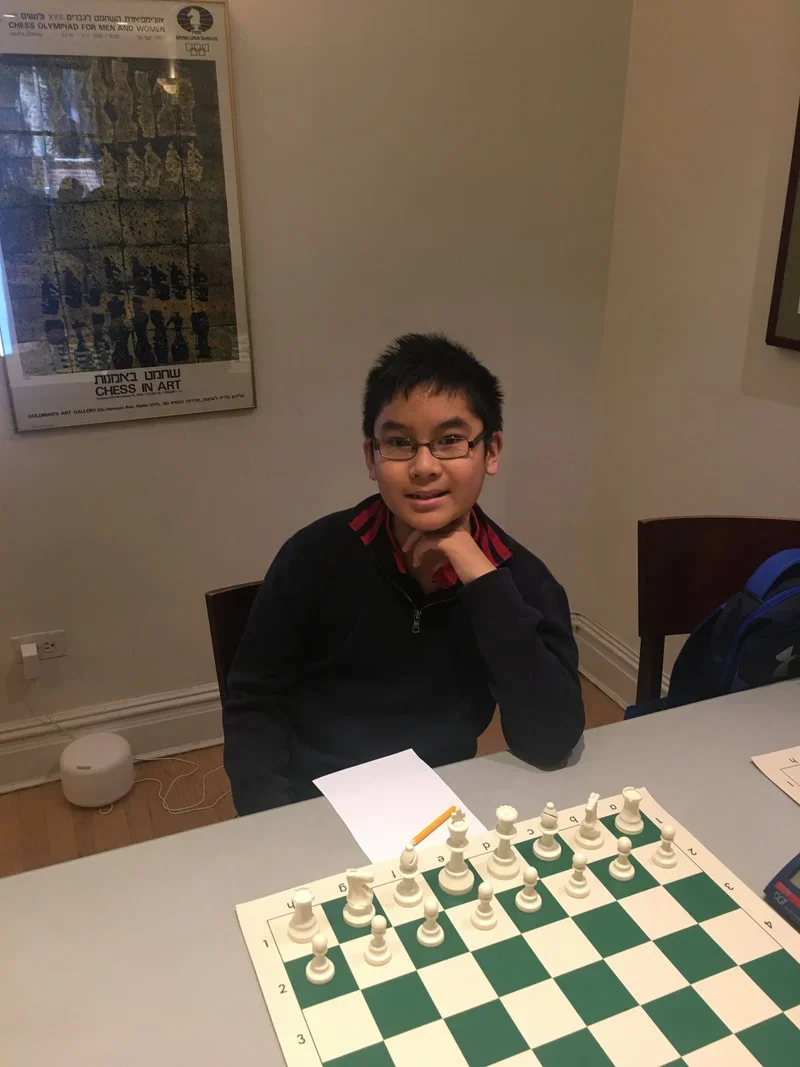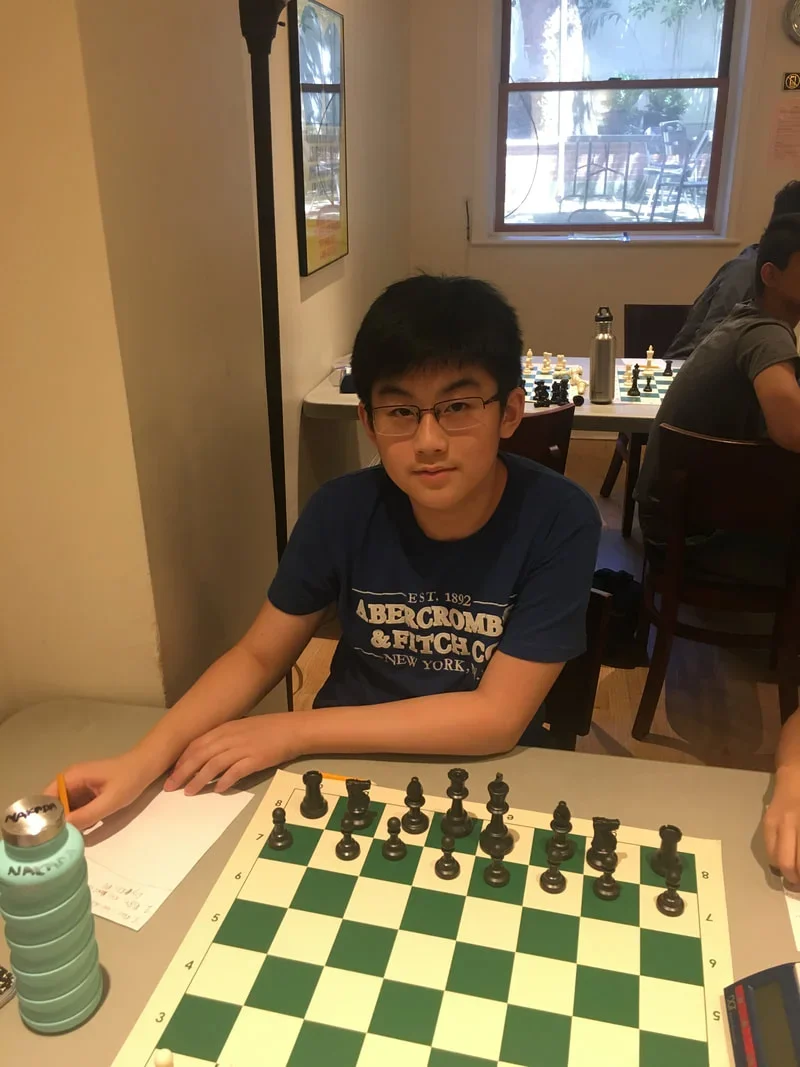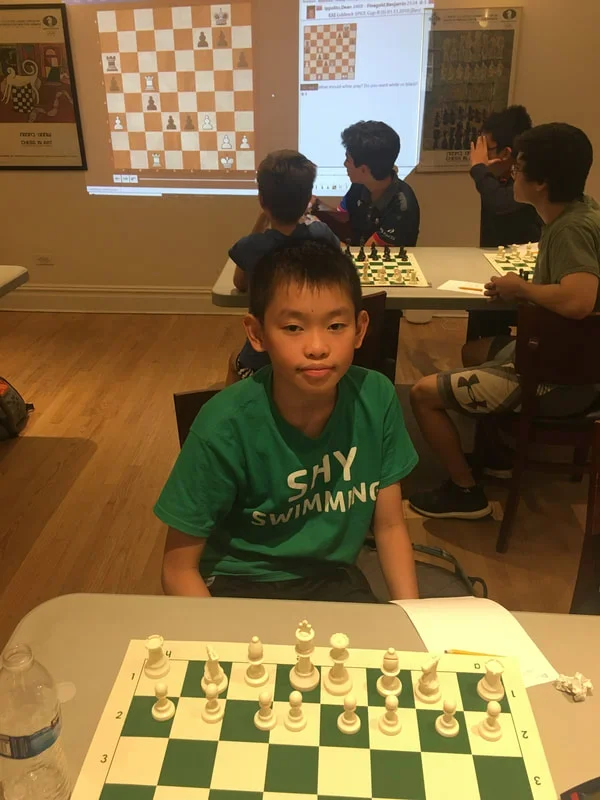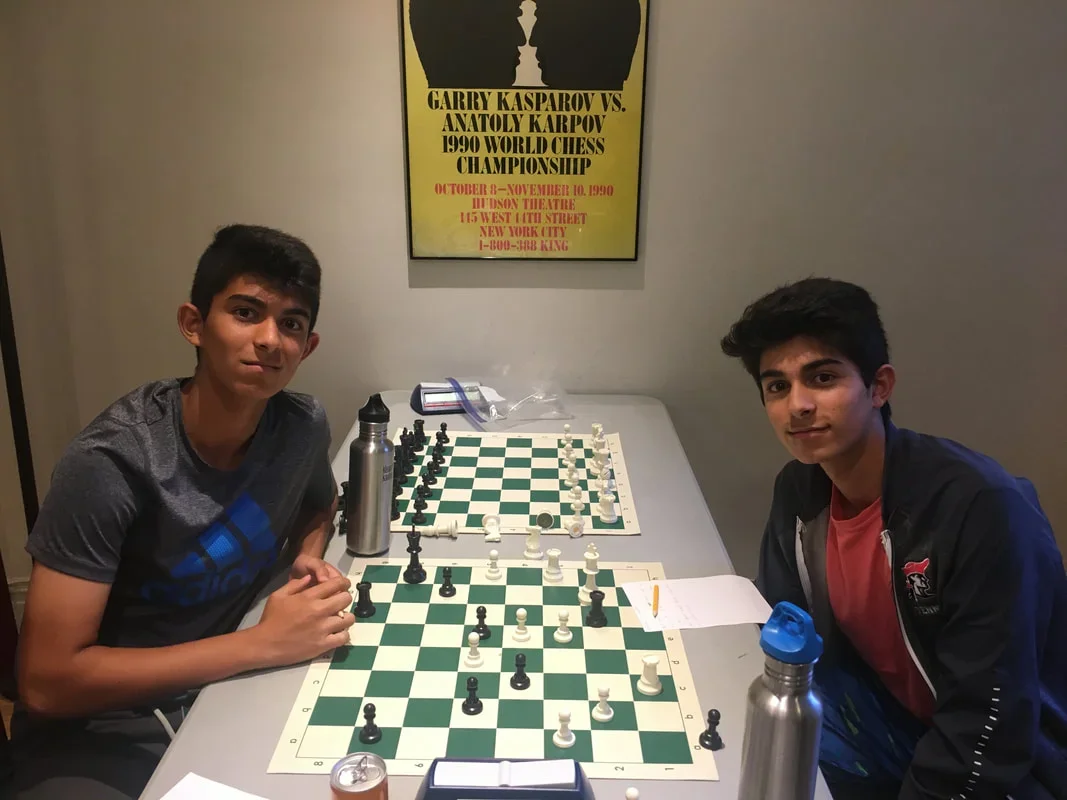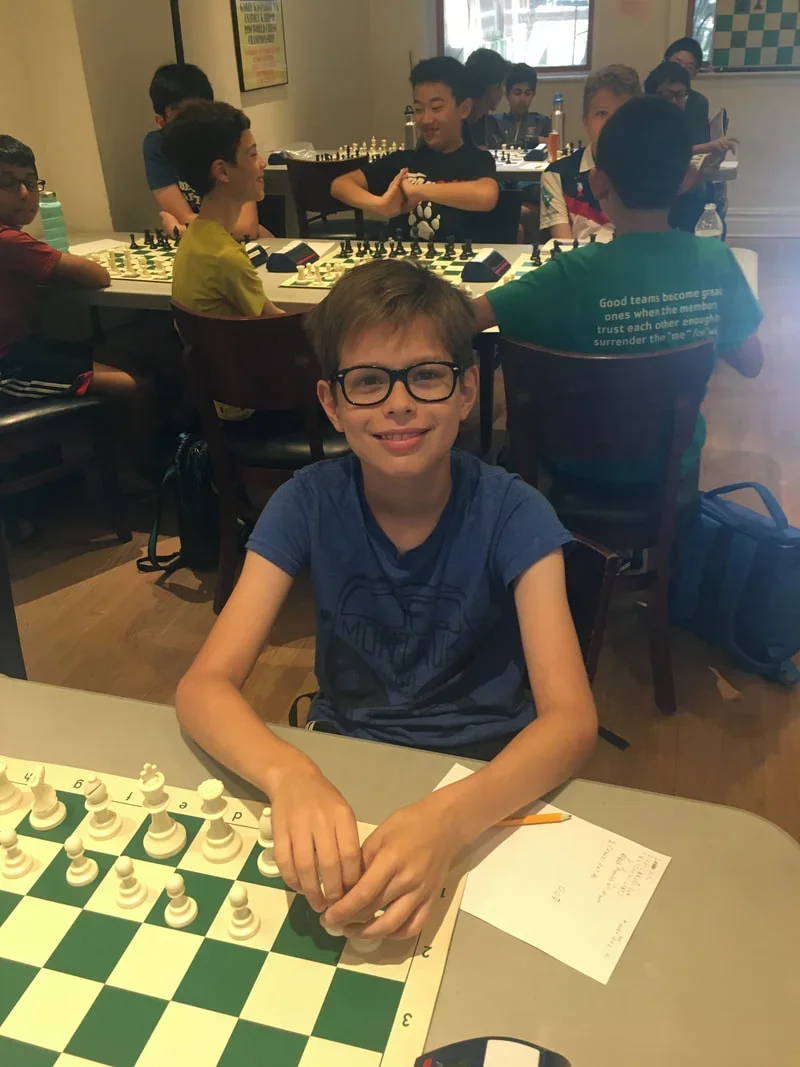This is the second of a four-part series, “Back to the US Chess School”, which gives readers an inside look into the elite training academies, held over the summer. Check out our first installment by Jed Sloan on USCS #48 in Saint Louis, and look for upcoming editions by Craig Hilby on #50, and Akira Nakada on #51
Blang! Ben Finegold bundled the pieces he captured and like a crane, triumphantly hurled them aside. “Anyone else?”, he said, and having only spent ten seconds on the clock, casually pondered between two mates, as we looked admiringly at his feat of winning every bullet game against the campers! On day one, Ben showed his youthful spirit and made us write in our notebooks “It is better to lose 1000 games than to draw one.”
During the past two summers, I had the honor to attend two US Chess Schools, and gained approximately 100 rating points each summer. I returned to chess from MATHCOUNTS Nationals and ARML (American Regional Math League) this June. For me, the US Chess School is the highlight of my summer chess journey. I envisioned the magnificent, majestic projector, glowing with classics that are still being enjoyed today! It was exciting to meet the smiling faces of IM Greg Shahade and other chess friends.
“Is this position mate or plus a million?” Ben asked as he showed Botvinnik [who was known for constricting his opponents positionally] winning in a bloody attack.
[pgn]
[Event "USCS 49 Article"]
[Site "Chicago USA"]
[Date "1968.??.??"]
[White "Botvinnik, M."]
[Black "Portisch, L."]
[Result "*"]
[ECO "A29"]
[Annotator "Davis"]
[SetUp "1"]
[FEN "r2qrbk1/1pp2ppp/2n5/p2bp3/Q7/P2PBNP1/1PR1PPBP/R5K1 w - - 0 15"]
[PlyCount "23"]
[EventDate "2017.05.25"]
[SourceVersionDate "2018.02.04"]
15. Rac1 {"Now, when Portisch made his 15th move he must have thought he was a
genius. Botvinik made him look like a beginner. But Portisch was good!" - Ben
Finegold} Nb8 $6 16. Rxc7 $1 Bc6 17. R1xc6 $1 {"If you have an excuse, sac the
exchange!" - Ben Finegold In this case, the excuse was an initiative, a pawn,
and a kingside attack.} bxc6 18. Rxf7 $1 h6 (18... Kxf7 {Taking on f7 loses
even quicker, but white is already winning as black is essentially down a rook
and a knight on the queenside.} 19. Qc4+ Kg6 20. Qg4+ Kf7 21. Ng5+ $18 {
winning the queen or mate.}) 19. Rb7 Qc8 20. Qc4+ Kh8 21. Nh4 Qxb7 22. Ng6+ Kh7
23. Be4 Bd6 24. Nxe5+ g6 25. Bxg6+ Kg7 {Is this mate or plus a million? -Ben
Finegold} 26. Bxh6+ {Games like this show that Botvinnik was not blind to
tactics.} *
[/pgn]
Puzzles and sacrifices could be our bread and butter, but when given an endgame, we would be bored by the absence of fiery sacrifices and red-hot mating attacks. “I can bet money that at least one of you will set up the position wrong,” GM Finegold joked as he changed the position of Black’s passed pawn on the neighboring board. “So, now that you CORRECTLY set up this endgame, play each other while I watch and laugh at you.” Ben said, and he wasn’t wrong. Many kids played 2. Kh5 claiming a straightforward draw, while Ben attached “at least five questions marks” to the move. It turns out that black has 2...Rb5!, followed by 5...f5+ and 6...f4, allowing him to pick off the g and h pawns and thus queen the f-pawn. Studies like this, requiring heavy and precise calculation, must have helped Ben achieve Grandmaster.
[pgn]
[Event "USCS 49 article"]
[Site "Chicago USA"]
[Date "2017.05.28"]
[White "Nimzowitsch, Aron"]
[Black "Tarrasch, SIegbert"]
[Result "0-1"]
[Annotator "Davis"]
[SetUp "1"]
[FEN "8/5k2/pr3p1K/5R2/7P/8/6P1/8 b - - 0 1"]
[PlyCount "9"]
[EventDate "2017.05.25"]
[SourceVersionDate "2018.02.04"]
{[#]} 1... Rb8 $1 {'If you don't play this, I don't know what you're doing
with black.' -Ben} 2. Kh5 $4 {"Five question marks."- Ben This natural move,
avoiding Rh8# allows black a forced win. It is hard to imagine that the game
would be over in just three more moves.} (2. Kh7 $1 Rb5 3. Rxb5 $1 (3. g4 $4 {
Originally, we agreed that this also made a draw, but the rook endgame lesson
turns into a won queen endgame for black!} Rxf5 4. gxf5 a5 5. h5 a4 6. h6 a3 7.
Kh8 a2 8. h7 Ke7 $1 {Black's king lets his counterpart out to avoid stalemate.}
9. Kg8 a1=Q 10. h8=Q Qa8+ (10... Qg1+ $4 11. Qg7+ $1 Qxg7+ 12. Kxg7 $18 {
would be a tragedy}) 11. Kh7 Qh1+ 12. Kg8 Qd5+ 13. Kh7 Qxf5+ $19 {Not
something easy to spot from move 1!}) 3... axb5 4. g4 {Now the pawns will
both promote.} b4 5. g5 fxg5 6. hxg5 b3 7. g6+ Ke7 8. g7 b2 9. g8=Q b1=Q+ $11)
2... Rb5 $1 3. Kg4 Rxf5 4. Kxf5 a5 5. Ke4 f5+ $3 {0-1 (39) Nimzowitsch,
A-Tarrasch,S San Sebastian 1911} (5... f5+ 6. Kd4 f4 $3 {now white will lose
all of the pawns and black will queen the f pawn} (6... Kg6 $4 7. g3 $11)) 0-1[/pgn]
Many World Champions are known for displaying powerful attacking games and we would watch as their opponents, ranked #2 in the world find their defenses crumble like houses of straw. GM Finegold emphasized the importance of calculating the opponent’s best resistance, even in the driest of all endgames. When we were sure that the position was a win for black, Ben challenged us play him and he drew with a fortress out of thin air. (Yes, it is the famous Vancura position mentioned in every good rook endgame textbook, but it is still not as cold a draw as the Philidor position). After convincing us that a draw was inevitable, he managed to promote his pawn against the seemingly impenetrable defense by starting off with the “waste move” 1...Ra2+. In a sense we were right; the position was a win for black, but on a much more complex level.
[pgn]
[Event "USCS 49 article"]
[Site "Chicago USA"]
[Date "????.??.??"]
[Round "?"]
[White "Rook Ending"]
[Black "Study"]
[Result "0-1"]
[Annotator "Davis"]
[SetUp "1"]
[FEN "8/8/8/4k3/R5p1/p7/7K/r7 w - - 0 1"]
[PlyCount "22"]
[EventDate "2017.05.25"]
[SourceVersionDate "2018.02.04"]
{[#]} 1. Rxg4 Ra2+ (1... Kd5 $4 {We were originally convinced that this won
for black, as the white king can't approach the e file (a2 and Rh1 wins).
Black just goes Rc1-c3 when possible and Kc5-b4-b3-a2 if white puts Rook
behind the pawn.} 2. Rg5+ Kc4 3. Rg4+ Kd3 4. Rg3+ Ke4 5. Rg4+ $11 {
Surprisingly, this fortress holds! White checks the black king away from the
pawn and restrains the rook by going to the third rank. a2 allows a simple
draw by Ra3.}) 2. Kg3 (2. Kh3 Rb2 $1 {As soon as white threatens Vancura's
fortress, black changes his setup.} 3. Ra4 a2 4. Kg3 Kd5 5. Kf3 Kc5 6. Ke3 Kb5
7. Ra8 Kc4 $19 {Black is just in time (1 tempo faster) to shoulder the white
king.}) 2... Kd5 $1 $19 {Now white does not have Rg3 with Vancura's because
his king is there.} 3. Kh3 Rc2 $1 {Not allowing the Vancura position. The black
king can now hide in the corner.} (3... Kc5 $4 {This king move throws away the
win! The black king has no refuge from side checks and cannot support the pawn.
The rook alone, cannot make any progress.} 4. Rg5+ Kb4 5. Rg4+ Kc3 6. Rg3+ Kb2
7. Rg2+ Kb1 8. Rg1+ $11) 4. Ra4 a2 {Now, with the white king on h3, black
makes it to the queenside just in time to win!} 5. Kg3 Kc5 6. Kf3 Kb5 7. Ra8
Kb4 8. Ke4 Kb3 9. Kd5 Kb2 10. Rb8+ Kc1 11. Ra8 Kb1 $19 0-1[/pgn]
“Set up the position. The taller one shall have white!”, Ben exclaimed, and a sad groan echoed through the shorter campers, as their position as Black looked lifeless and hopeless. However, a hidden stalemate trap lay, sneaky as a snake ready to pounce. White is indeed winning from the very start, but the “quick liquidation win” of 1. d6?? leads to a cold shower for white - a stalemate with the black king locking himself in the dungeon on a5! Instead, white needs to shuffle around and push d6 at the correct time, so he can follow up with Kd5, winning. Imagine blowing away your deserved half point like that after five hours of sweat and tension.
[pgn]
[Event "USCS 49 Article"]
[Site "Chicago USA"]
[Date "????.??.??"]
[Round "?"]
[White "Bishop Endgame"]
[Black "Study"]
[Result "1/2-1/2"]
[Annotator "Davis"]
[SetUp "1"]
[FEN "1B3b2/3k4/p7/2pP1K2/1pP5/1P6/P7/8 w - - 0 1"]
[PlyCount "11"]
[EventDate "2017.05.25"]
[SourceVersionDate "2018.02.04"]
{[#]} 1. d6 $4 {This move hastens the end, but in a bad way. Instead of the
decisive Zugzwang, white finds that his opponent takes refuge on a5.} (1. Be5 {
Patient play was the way to go. White will eventually win with better bishop,
and passed pawn/better pawn structure.}) 1... Bxd6 2. Bxd6 Kxd6 3. Kf6 Kc6 4.
Ke6 Kb6 5. Kd6 {It seems that all is over and black will drop all his pawns.
But..} Ka5 $1 6. Kxc5 {Stalemate.} 1/2-1/2[/pgn]
We had many fun eureka moments while studying studies that unravel very subtly, while also looking forward to the bullet tournament. This anticipated contest was a chance to smash the clocks (none of them broke, fortunately). It was also a rare occasion to watch masters hang pieces! This camp’s bullet tournament was much more competitive than normal, as Ben Finegold was giving practice games for 30 minutes after the end of each day of camp. His streak of all wins against the campers amounts to about 50 consecutive bullet wins. In order to avoid a predictable tournament winner, GM Finegold was not allowed to participate.
The time control of 10 seconds with a 1 second increment insured that the time scramble mayhem started at the start and ran throughout the game. Video cameras might have shown in the flaming flashes of battle, pawns being adjusted from c2 to d2 to d3 and the move Bxf6 being played, capturing a rook on f7. The ultimate winner of the tournament was Roshan Idnani, but an honorable mention goes to Jack Levine, my incoming Hunter College High School teammate, for ending three of his four bullet games with more than 30 seconds on the clock. (Yes, he gained more than 20 seconds with the 1 second increment!)
This camp is one that we will miss, and Ben Finegold was visibly saddened on the last day, as he stopped making jokes. This was not the final farewell though, as many of the campers showed up at the Manhattan Open, where I achieved a 2498 performance. The US Chess School inspired me, and every time a critical position appeared, a sudden electrical spark would ignite like a bright lamp, bringing me back in front of the projector where precise calculations were done, and I would yearn to do the same. Blang! The sturdy wooden door of the Marshall shut behind us, its hinges gradually revolving inward like that of a powerful train engine, as if triumphantly escorting us to a new, and higher level of chess.
Thanks to Dr.Jim Roberts, the Marshall Chess Club, Greg Shahade and Ben Finegold for making this camp possible.
Stay posted with the US Chess School on their website, instagram and twitter. Categories
Archives
- January 2026 (8)
- December 2025 (27)
- November 2025 (29)
- October 2025 (39)
- September 2025 (27)
- August 2025 (29)
- July 2025 (43)
- June 2025 (25)
- May 2025 (24)
- April 2025 (29)
- March 2025 (29)
- February 2025 (20)
- January 2025 (24)
- December 2024 (34)
- November 2024 (18)
- October 2024 (35)
- September 2024 (23)
- August 2024 (27)
- July 2024 (44)
- June 2024 (27)
- May 2024 (31)
- April 2024 (51)
- March 2024 (34)
- February 2024 (25)
- January 2024 (26)
- December 2023 (29)
- November 2023 (26)
- October 2023 (37)
- September 2023 (27)
- August 2023 (37)
- July 2023 (47)
- June 2023 (33)
- May 2023 (37)
- April 2023 (45)
- March 2023 (37)
- February 2023 (28)
- January 2023 (31)
- December 2022 (23)
- November 2022 (32)
- October 2022 (31)
- September 2022 (19)
- August 2022 (39)
- July 2022 (32)
- June 2022 (35)
- May 2022 (21)
- April 2022 (31)
- March 2022 (33)
- February 2022 (21)
- January 2022 (27)
- December 2021 (36)
- November 2021 (34)
- October 2021 (25)
- September 2021 (25)
- August 2021 (41)
- July 2021 (36)
- June 2021 (29)
- May 2021 (29)
- April 2021 (31)
- March 2021 (33)
- February 2021 (28)
- January 2021 (29)
- December 2020 (38)
- November 2020 (40)
- October 2020 (41)
- September 2020 (35)
- August 2020 (38)
- July 2020 (36)
- June 2020 (46)
- May 2020 (42)
- April 2020 (37)
- March 2020 (60)
- February 2020 (38)
- January 2020 (45)
- December 2019 (34)
- November 2019 (35)
- October 2019 (42)
- September 2019 (45)
- August 2019 (56)
- July 2019 (44)
- June 2019 (35)
- May 2019 (40)
- April 2019 (48)
- March 2019 (61)
- February 2019 (39)
- January 2019 (30)
- December 2018 (29)
- November 2018 (51)
- October 2018 (45)
- September 2018 (29)
- August 2018 (49)
- July 2018 (35)
- June 2018 (31)
- May 2018 (39)
- April 2018 (31)
- March 2018 (26)
- February 2018 (33)
- January 2018 (30)
- December 2017 (26)
- November 2017 (24)
- October 2017 (30)
- September 2017 (30)
- August 2017 (31)
- July 2017 (28)
- June 2017 (32)
- May 2017 (26)
- April 2017 (37)
- March 2017 (28)
- February 2017 (30)
- January 2017 (27)
- December 2016 (29)
- November 2016 (24)
- October 2016 (32)
- September 2016 (31)
- August 2016 (27)
- July 2016 (24)
- June 2016 (26)
- May 2016 (19)
- April 2016 (30)
- March 2016 (36)
- February 2016 (28)
- January 2016 (32)
- December 2015 (26)
- November 2015 (23)
- October 2015 (16)
- September 2015 (28)
- August 2015 (28)
- July 2015 (6)
- June 2015 (1)
- May 2015 (2)
- April 2015 (1)
- February 2015 (3)
- January 2015 (1)
- December 2014 (1)
- July 2010 (1)
- October 1991 (1)
- August 1989 (1)
- January 1988 (1)
- December 1983 (1)



